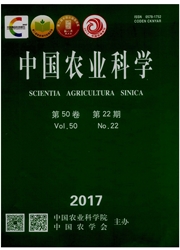

 中文摘要:
中文摘要:
【目的】探讨茉莉酸甲酯(MeJA)对采后香蕉果实耐冷诱导的效果及其对活性氧代谢、Ca2LATPase活性的影响。【方法】香蕉果皮用10pmol·L^-1 MeJA处理1min,在20℃恒温培养1d(取样作第0天),然后置于7℃下离体培养10d,测定果皮冷害指数、细胞膜透性、过氧化氢和超氧阴离子含量、过氧化氢酶(CAT)、抗坏血酸过氧化物酶(APX)、NADPH氧化酶以及Ca2-ATPase活性的变化。【结果】与对照香蕉果皮相比,10μmol.L^-1 MeJA处理的冷害指数较低、细胞膜透性增加缓慢;MeJA处理诱导了果皮H2O2含量和O2^-产生速率的提高,并维持了前4d的高水平,而MeJA处理降低了CAT和APX的活性,并在前4d维持了较低的水平;研究还发现,MeJA处理还诱导了NADPH氧化酶和Ca2^+-ATPase活性的升高。【结论】MeJA诱导的活性氧猝发可能作为信号分子参与诱导了香蕉果皮冷害和耐冷诱导,并可能与钙信号相关。
 英文摘要:
英文摘要:
[Objective] The effects of methyl jasmonate (MeJA) on cold resistance, reactive oxygen species (ROS) metabolism and Ca^2+-ATPase activity of postharvest banana fruit were investigated in this paper. [Method] Banana peels were treated with 10 μmol·L^-1 MeJA for 1 min and incubated at 20℃ for 1 day (sampled as Day 0), and then incubated in vitro at 7℃ for 10 days. The chilling injury index, cell membrane permeability, contents of H2O2 and O2, changes in activities of CAT, APX, NADPH oxidase and Ca^2+-ATPase were determined. [Result] Compared with control peels, the chilling injury index of MeJA treated peels was less and the increase of cell membrane permeability was slower. Moreover, MeJA treatment induced the increase of H2O2 content and O2 production and maintained their high levels in early 4 days. However, MeJA treatment reduced the activities of CAT and APX and maintained low activity in early 4 days. MeJA treatment was also found to induce the activities of NADPH oxidase and Ca2^+-ATPase of banana peels. [Conclusion] The reactive oxygen species induced by MeJA might serve as signal moleculars and be involved in chilling injury and chilling resistance of banana peels, and they might also induce calcium signaling.
 同期刊论文项目
同期刊论文项目
 同项目期刊论文
同项目期刊论文
 Identification of (()-epicatechin as the direct substrate for polyphenol oxidase from longan fruit p
Identification of (()-epicatechin as the direct substrate for polyphenol oxidase from longan fruit p Crucial roles of membrane stability and its related proteins in the tolerance of
peach fruit to chil
Crucial roles of membrane stability and its related proteins in the tolerance of
peach fruit to chil Responses of reactive oxygen metabolism and quality in mango fruit to exogenous oxalic acid or salic
Responses of reactive oxygen metabolism and quality in mango fruit to exogenous oxalic acid or salic Effect of ATP on changes of fatty acids in harvested litchi fruit infected by Peronophythora litchii
Effect of ATP on changes of fatty acids in harvested litchi fruit infected by Peronophythora litchii A comparative identification of Ochratoxin A in longan fruit pulp by high-performance liquid chromat
A comparative identification of Ochratoxin A in longan fruit pulp by high-performance liquid chromat Peach fruit acquired
tolerance to low temperature stress by accumulation of linolenic acid and N-acy
Peach fruit acquired
tolerance to low temperature stress by accumulation of linolenic acid and N-acy Differential expression of Expansin and XET genes associated with aril breakdown in harvested longan
Differential expression of Expansin and XET genes associated with aril breakdown in harvested longan Purification and characterization of anthocyanin degradation enzyme from litchi anthocyanin degradat
Purification and characterization of anthocyanin degradation enzyme from litchi anthocyanin degradat Effects of cold storage duration on subsequent quality, energy and membrane permeability and lipid d
Effects of cold storage duration on subsequent quality, energy and membrane permeability and lipid d Antioxidant activities and contents of polyphenoloxidase substrates from pericarp tissue of litchi f
Antioxidant activities and contents of polyphenoloxidase substrates from pericarp tissue of litchi f Isolation and characterization of three ethylene perception elements and their expressions during lo
Isolation and characterization of three ethylene perception elements and their expressions during lo 期刊信息
期刊信息
